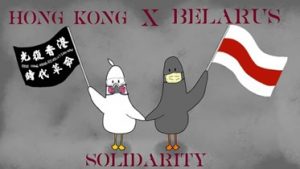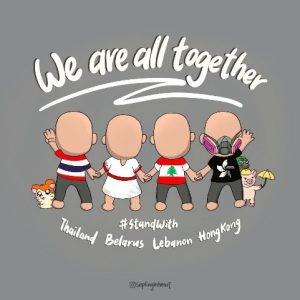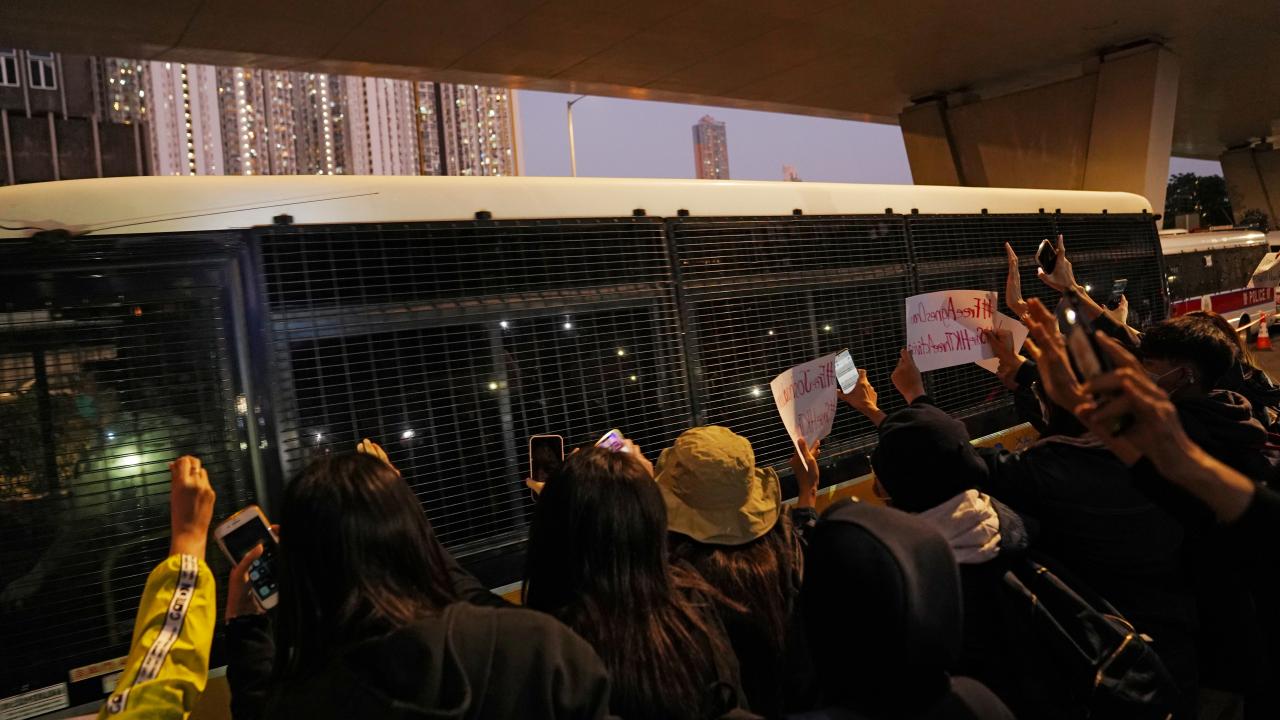
The year that wasn’t
All countries have been changed and scarred by the coronavirus pandemic. Which country has been affected most would be hard to say, death tolls have varied widely by country, economies have all been shaken and politics and politicians have seen agendas reshaped by the public health emergency. Hong Kong has perhaps seen the most political disruption in spite of the fact that they have largely been able to avoid the worst of the virus. Hong Kong is currently experiencing what it calls its fourth wave of infections but for a city of over 7 million people and a total case count of less than 10,000 it has an envious record when compared to many other places.
Hong Kong ended 2019 with the protest camp largely buoyed by their landslide success in the local district council elections. Violent protests had largely worn themselves out and although tear gas was fired at the start of the New Year that is reflective of the excesses of the police force rather the continuation of the hard-core protest movement seen through much of the latter half of the year.
It was the September 2020 Legco election which the protest movement was thinking about. A real chance for pan-democrats and protest parties to gain a majority in the Legislative Council. Those hopes were dashed though as the elections were postponed for 1 year by Hong Kong Chief Executive Carrie Lam citing Covid-19. At the time of the announcement Hong Kong had less than 5,000 infections over the entire year and the postponement was clearly political in nature. No effort was made to present alternate voting arrangements, online or postal ballots were never offered, even the one-year postponement is arbitrary and just pushed the vote just someway off into the future. Throughout this year many countries have held elections, South Korea, Singapore, Belarus, Kyrgyzstan, the US and most recently Indonesia, have all been able to hold elections with pandemic conditions generally much worse than in Hong Kong. Hong Kong’s adherence to basic democracy has largely faltered. It is interesting to note though that in the highly rigged Belarussian elections the losing side employed many of the same tactics as the Hong Kong protesters of last year and the Hong Kong protest movement claimed solidarity with the Belarussian protesters. This is part of a larger global narrative where the Hong Kong protest movement is being seen a part of a global, social media connected protest movement against authoritarian governments whether in Europe, South America, or Asia.
If there was hope for success in the Legco elections, there was also understanding that the year and struggle was not going to be an easy one, but few would have predicted how difficult the situation has become for those who speak out against the government. The headlines, almost daily now, out of Hong Kong offer little hope for the anti-Beijing or anti-government camp, instead arrests and restrictions dominant. The demand of the government is obedience, dissent will not be tolerated.
Protest graphics connecting Hong Kong protests in a wider global context
Source: Telegram protest channel
The reality of the year
Any hopes for building on the success of the late 2019 elections were soon dashed as Covid-19 took hold globally and the Hong Kong government introduced a raft of social distancing measures which were just as effective in limiting peaceful protest as they were in slowing the spread of the virus. The introduction of the National Security Law, NSL, has been discussed already in (GRICI 1487 Hong Kong City) but it has only been in the past few months where the full extent of the Hong Kong government clampdown and slow revenge on the protest camp has been seen.
With the full support, and encouragement of the Chinese central government the Hong Kong authorities have begun a systematic house cleaning of the opposition camp. It would take too long to fully detail the scale of the actions across all aspects of Hong Kong civil and political society but the below timeline courtesy of the AFP, provides an excellent summary of the past 5 months.
Those arrested read like a Who’s Who of oppositions figures within Hong Kong, a list of “usual suspects” which have long been seen by Beijing as troublemakers. Jimmy Lai, the mainland migrant to Hong Kong, who made it big in retail then moved into publishing with the popular tabloid Apple Daily is the most prominent name on the list. Having been initially arrested and charged with fraud he was further charged with breaching the NSL and has been refused bail and will be held until his next court appearance in April 2021. Lai has been an outspoken critic of Beijing for many years and was also one of the few tycoons to praise the British rule in Hong Kong for providing the opportunity for his rag to riches story.
Long time democracy activist Tam Tak-Chi was initially arrested under the NSL for chanting well know Hong Kong protest slogans, but he was eventually charged with sedition, a charge, pre-dating the NSL, under the Hong Kong Crimes Ordinance. Chanting slogans which the government in Beijing is afraid of is his crime. Not a manifesto to overthrow the state, not planning to commit violence or destroy property but chanting of slogans. And in the case of the Hong Kong protest slogans their action meaning isn’t even that clear except as being a clear rejection of the Hong Kong government policy or lack thereof when it comes to political reform. Tam’s court date is set for May of next year and while he is a threat to no one any presumption of innocence under the common law framework in Hong Kong has been effectively dismissed as he has been refused bail and will have been detained for 8 months before he even comes to trial.

Painting of Agnes Chow. Artist: Sakura. Dec 2020.
Three other, high profile, but much younger activists have recently been sentenced. Although only in their twenties, Joshua Wong, Agnes Chow and Ivan Lam are veterans of the Hong Kong SAR protest movement. In early December they were sentenced to between 7 and 13.5 months in jail for illegal assembly relating to protests from the middle of last year. Chow, a fluent Japanese speaking with a large following in Japan, turned 24 the day after sentencing. She is currently facing an investigation under the NSL and it would not be surprising to see further charges being brought against the trio. Ironically although these young protestors rose to prominence during earlier protests, especially the Occupy Central movement of 2014 they were not seen as leaders in the protests of last year. In fact the protests of last year explicitly rejected the idea of group of core leaders as was seen during Occupy as that could all too easily lead to infighting and division which market the end of the Occupy protests.
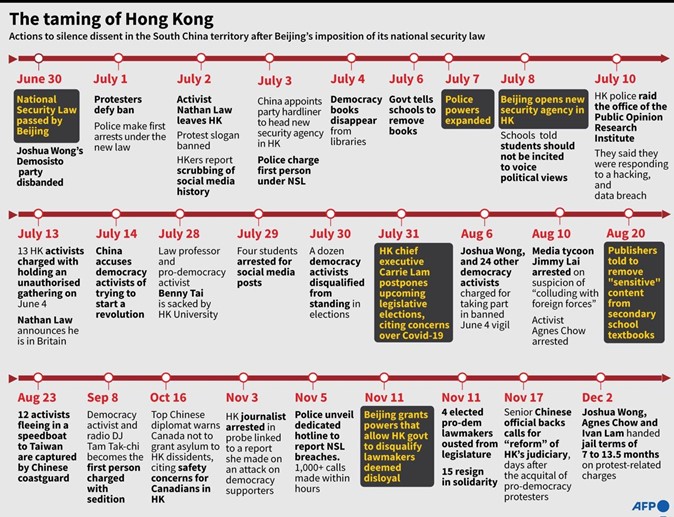
Summary timeline of Hong Kong government’s actions to stifle dissent within the territory. Source: AFP twitter.
The list of arrestees is matched by a list who have made a dash for freedom outside of Hong Kong. 12 activists tried to leave via speedboat to Taiwan and were picked up at sea by Mainland patrol forces, quite possibly with help from the Hong Kong police. They currently remain incommunicado in a Shenzhen jail. Others were more successful. Nathan Law, a co-founder of the HK party Demosisto along with Joshua Wong and Agnes Chow, made it to the UK, as did ex-Legco lawmaker Ted Hui, who received permission to travel to Denmark for a conference but then broke his bail conditions and travelled onto the UK where he sought asylum. Hui’s escape to the UK resulted in the freezing of his other family bank accounts by HSBC. The exact reason for the initial suspension was unclear and the accounts were later unfrozen. But since the NSL explicitly provides the police with the power to freeze and seize property when it comes to NSL investigations the implications are chilling. The NSL largely gives the HK Police Force the legal cover to take any actions they want in the name of national security.
Sixtus “Baggio”Leung, who was elected to Legco but then was disqualified from taking his seat on the grounds his oath taking was insincere, recently announced he had arrived in the US and had claimed political asylum.
This is the sorry reality of Hong Kong democracy today under the Carrie Lam administration whose sole interest is not the welfare of the Hong Kong people but loyalty to Beijing. It would wrong to paint the protest and opposition side as without fault. Some would consider their tactics flawed, and it is only right to be alarmed by the excesses of a small minority at last year’s protests, but this is after years of hollowing out of a viable space for opposition to the Hong Kong government. A legislative framework which was stacked against the opposition since the handover and successive Hong Kong leaders who wholly refuse to take the concerns of millions of their citizens seriously has led to where Hong Kong is today. Under Carrie Lam operating within Xi Jinping’s ever more authoritarian China there is little hope of an improvement.
————————————————————————————————-
Hong Kong justice
Partial screen grab of the SCMP website juxtaposing two Hong Kong court cases. Keith Fong was arrested in an early morning raid by 20 police officers. He was detained on suspicion of possessing offensive weapons after being found with 20 laser pointers during last year’s protests. The cheap, and widely available laser pointers were considered a weapon by the Hong Kong police as they were used to distract and confuse police officers. He could face up to 7 years in jail. Meantime a local doctor found guilty of killing a patient after a beauty treatment went wrong received a 3.5-year jail sentence.
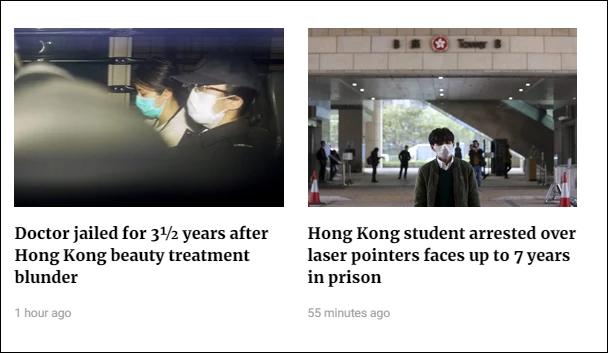
Source: SCMP Website 8 December 2020
————————————————————————————————-
Not everything going their way
In spite of the arrests and prosecutions not everything goes the government’s way. There is still an independent judiciary and while both Mainland and some HK officials try to undermine its independence, many are still doing the right thing: judging the cases on evidence presented and making informed and independent judgements.
Magistrates Stanley Ho Chun-yiu, Gary Lam and Lily Wong have all spoken out against poor prosecution cases. Back in August Ho acquitted District Councillor Jocelyn Chau on a charge of assaulting a police officer. In his ruling he said the officers’ testimony was unreliable and that they had told “lie after lie.” A truly damning indictment of police honest.
In the case of Andy Chan, the founder of the HK National Party, which is now banned but openly promoted HK independence, who was on trial for assaulting a police officer, Lily Wong acquitted Chan on the grounds that the prosecution did not meet the standard of “beyond reasonable doubt” required in such criminal cases.
Yet these acquittals, while important for the defendants and a strong sign of judicial independence do not change the overall direction of travel in Hong Kong. The slow strangling of dissent in the city continues. The entire protest movement of last year is presented as extremist, a threat to the city and country and opposition to the government is seen as promotion of independence. Carrie Lam remains, as she did last year, totally deaf to the concerns of millions of Hongkongers, as she said in a recent interview when asked about her responsibility for the unrest of last year “I do not feel guilty. What wrong have I done? I have introduced a piece of legislation for very good reasons.”
With the roll out of Covid-19 vaccines there would at last appear to be light at the end of the pandemic tunnel so some sort of return to normal will start to establish itself but there is little reason to think that Hong Kong’s opposition will find any rest. The clampdown will roll on sending a chill through all areas of civil society and rob the current generation of Hongkongers of any hope for their future.
カテゴリー
最近の投稿
- 習近平の思惑_その1 「対高市エール投稿」により対中ディールで失点し、習近平に譲歩するトランプ
- 記憶に残る1月
- 高市圧勝、中国の反応とトランプの絶賛に潜む危機
- 戦わずに中国をいなす:米国の戦略転換と台湾の安全保障を巡るジレンマ
- トランプ「習近平との春節電話会談で蜜月演出」し、高市政権誕生にはエール 日本を対中ディールの材料に?
- A January to Remember
- Managing China Without War: The U.S. Strategic Turn and Taiwan’s Security Dilemma
- 「世界の真ん中で咲き誇る高市外交」今やいずこ? 世界が震撼する財政悪化震源地「サナエ・ショック」
- 中国の中央軍事委員会要人失脚は何を物語るのか?
- 個人の人気で裏金議員を復活させ党内派閥を作る解散か? しかし高市政権である限り習近平の日本叩きは続く

